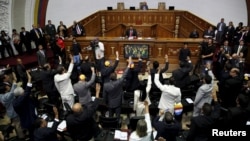Venezuela's opposition took control of Congress for the first time in 16 years on Tuesday in a rowdy session, setting up a power struggle with President Nicolas Maduro amid a worsening economic crisis.
The Democratic Unity coalition won a two-thirds majority in December's legislative election by capitalizing on anger over a shrinking economy, soaring prices and chronic product shortages reminiscent of Soviet-bloc economies.
Maduro has dismissed the new assembly as "right-wing" and "bourgeois," and accuses the opposition of preparing to roll back social programs created by late socialist President Hugo Chavez.
Veteran opposition legislator Henry Ramos was elected the new head of Congress in a session in which the two sides chanted slogans at one another and traded charges of corruption and betrayal.
"What did we offer in our campaign? To recover the autonomy of the legislative branch," said Ramos in his opening speech to Congress. "This has been the loudspeaker of the presidential palace, the echo chamber of the executive branch."
Ramos flaunted the opposition's newfound control over the legislature by abruptly cutting off one Socialist Party deputy's diatribe against the opposition, saying he had run out of time.
When heckled by another socialist deputy over a procedural complaint, Ramos brushed him aside by saying "Take it easy, congressman, things have changed here."
The Dec. 6 election gave the opposition its most decisive victory since Chavez took power in 1999. His generous spending of oil revenue had made him nearly invincible at the polls during his 14-year rule.
Maduro, a former bus driver and Chavez's anointed successor, has struggled since his election in 2013 to match the latter's charisma. His government has repeatedly balked at implementing broad economic reforms despite promising them.
On Tuesday, reporters interviewed deputies and walked freely on the floor of Congress for the first time in years, a practice that had been prohibited by the socialist leadership.
A portrait of late Chavez that hung in the main congressional chamber, a symbol of what critics call illegal politicization of public institutions, was removed.
Socialists Walk Out
The Socialist Party deputies ultimately walked out of the session en masse following the election of the new assembly leadership, arguing Ramos had violated parliamentary rules by giving a speech during the opening session.
"They've barely even opened the first session and they've already violated the debate regulations," said Socialist Party Deputy Diosdado Cabello, previous head of the assembly.
The deputies joined a nearby demonstration where hundreds of government supporters clad in red-shirts chanted slogans and played drums.
Police and National Guard troops were deployed in the area around the National Assembly to prevent violence between opposition sympathizers and Maduro supporters. No major incidents had been reported as of the early afternoon.
The opposition coalition won 112 seats in the Dec. 6, for a commanding two-thirds majority.
But the Supreme Court in December granted injunctions that blocked four deputies - three from the opposition and one allied with the government - from taking office after losing Socialist Party candidates filed legal challenges to the results.
The opposition dubbed the ruling a "judicial coup" meant to strip it of its supermajority. It has said it will swear in the three barred lawmakers, though government allies say that would defy justice and render the assembly's decisions illegitimate.
The court did not describe the underlying arguments against the election of the deputies, all of whom are from the rural and sparsely-populated southwestern state of Amazonas.
Disputing all the results in that state required the Socialist Party to contest the seat won by its own candidate.
Although the opposition's legislative victory was driven by anger over the economy, it has few options to resolve the crisis because Maduro's government controls the most important day-to-day operations of the economy.
Opposition lawmakers have instead promised to take up an amnesty law seeking the freedom of opposition activists jailed for protesting against Maduro, and a measure to grant property titles to those who received homes from the government.
"We've come because Venezuela is celebrating. Today democracy returns to our country," said Milagros Hernandez, 58, a housewife who joined an opposition rally in downtown Caracas.





